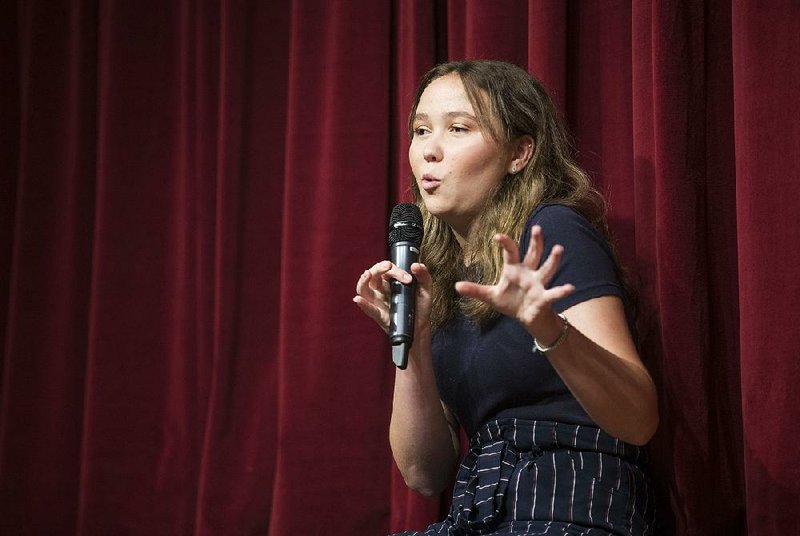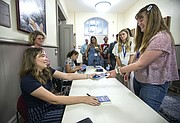FAYETTEVILLE -- Suddenly everything seemed unreal at Marjory Stoneman Douglas High School.
"When you hear kids scream like that, like -- there's no mistaking. You know something is horribly wrong," said Lauren Hogg, now 16.
Valentine's Day, 2018. Near the bus loop, classmates running while clutching teddy bears. A day that had started normally.
"I don't know how else to describe it. Everything just seemed, like, unreal," Hogg said.
Hogg told a group of educators Friday about the Parkland, Fla., school shooting and her work as an activist to end gun violence since. She spoke at a conference held at the University of Arkansas, Fayetteville.
Three days after the shooting, Hogg said, a group of about 15 or so "broken" students began pouring their energies into activism. She missed the first meeting, she said. Looking back, she said she thinks she might have been attending a friend's funeral.
"The start of our movement was trying to distract ourselves," Hogg said.
Hogg helped organize the March for Our Lives event in Washington, D.C., attended by hundreds of thousands of people just over a month after the shooting. Elsewhere, including in Arkansas, students and others held rallies on the same day against gun violence.
She has since co-authored a book, #NeverAgain, with her brother, David, also a Marjory Stoneman Douglas High School student at the time of the shooting, with proceeds going to organizations working against gun violence, she said.
Mixing humor with seriousness, Hogg spoke about the early days of her activism.
"It started with a hashtag," Hogg said, referring to the social media use of #NeverAgain to gain attention.
Plenty of hard work followed trying to make calls and send emails to build connections so that the march could happen, Hogg said.
"Honestly, I don't think most of us slept that first week just because we were working so hard. We worked until we passed out, literally on each other's floors. Which is really unhealthy, like, I don't recommend that," Hogg said, drawing some laughter from the crowd of about 100 gathered to hear her speak.
Celebrities used their social media accounts to build buzz for the event, while donations helped pay for stage permits -- "Oprah, I love you," Hogg said. And the turnout left Hogg speechless, she said.
That day and her efforts since are about more than school shootings, Hogg said.
"Early on in our movement, we decided we didn't want this just to be about school shootings. Because that's literally the smallest part of gun violence," Hogg said. On the day of the March for Our Lives event, it was important to share the stage with other young activists fighting against different types of gun violence, Hogg said.
Hogg is also the author of a forthcoming graphic novel, Activist, that tells the story of the movement against gun violence following the shooting deaths of 17 students in Parkland.
"I'll never be able to describe everything that happened that day and the horrors that went on," Hogg said, who was 14 and a freshman at the time of the shooting.
She said she was taking an elective class in a different building than the one where the shooter opened fire, her class set to exit the building after hearing an alarm for what they thought was a drill.
That's when they heard gunshots, she said.
While students and teachers had gone through training for what to do in such circumstances, "nothing can prepare you for something like that, when you hear kids screaming like that," Hogg said.
Her class, from near the exit, ran back upstairs to stay inside a classroom, she said. The shooting suspect, a 19-year-old expelled student, had targeted a building housing freshman classes, with Hogg's building spared from the violence, she said.
Waiting in the classroom, students on their phones began getting videos and texts from friends, she said.
"The worst part was seeing my friends in these videos covered in blood," Hogg said. She said she knows friends who held the hand of a dying friend. Texts came in, telling of those who had been shot, as students in the darkened classroom followed orders to stay silent.
"Having to watch kids, like, suppress their screams, that's something that I'll never, ever forget. To really see that depth of raw humanity. We're literally kids, and we were watching our friends die on our phones," Hogg said.
Hogg spoke as part of a national conference backed by the National Council of Teachers of English for language-arts educators to discuss advocacy and activism.
"It's a real honor to have her here," said Chris Goering, a UA professor and chair of the English Language Arts Teacher Educators, the group holding the conference.
Metro on 07/20/2019

